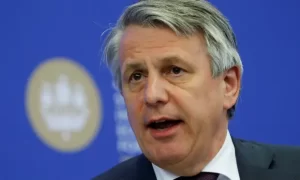Shell chief’s pay rose by a quarter in 2021 to £6m
The Shell chief executive Ben van Beurden’s pay rose by a quarter in 2021 to £6m, as the fossil fuel producer benefited from soaring energy prices amid calls for a windfall tax on energy companies. Read more: Shell chief’s pay rose by a quarter in 2021 to £6m


The Shell chief executive Ben van Beurden’s pay rose by a quarter in 2021 to £6m, as the fossil fuel producer benefited from soaring energy prices amid calls for a windfall tax on energy companies.
The FTSE 100 company reported record profits during 2021, thanks in part to a gas price surge in the final three months of the year amid a rebound in demand for commodities as the global economy recovered from coronavirus pandemic lockdowns.
Van Beurden’s pay rise, to €7.4m (£6.1m) in 2021 from €5.8m (£4.9m) the year before, came amid widespread calls, including from the Labour party, for booming energy companies to pay a windfall tax on profits as people in Britain and beyond struggle with a cost-of-living crisis.
Average weekly earnings for British people rose by 4.3% in the year to December, meaning their real wages fell because of inflation, caused in part by higher energy prices.
Van Beurden was paid 57 times more than the median Shell worker in 2021, according to the company’s annual report.
Luke Hildyard, a director of the High Pay Centre, a campaign group, said: “Shell’s chief executive rakes in millions and half their UK employees make well over £100,000. Oil and gas companies have argued that money for a windfall tax would have to come from their budget earmarked for long-term investments. But when they are paying out such huge sums to wealthy investors and top earning staff that argument looks laughably weak.
“Businesses that truly want to serve society should be happy to contribute a slightly higher rate of tax at a time when they are having a bonanza year, through pure good luck rather than their own hard work or innovation, while society as a whole is struggling with rising costs, stagnating wages and further economic turmoil.”
Russia’s invasion of Ukraine has caused energy prices to rise further since the start of the year, suggesting that even higher bills may be likely for households and businesses.
Van Beurden was forced to withdraw Shell from its joint ventures with Kremlin-controlled oil firm Gazprom worth a total of $3bn, including drilling projects at the Sakhalin-II liquefied natural gas facility, projects in Salym and Gydan, both in western Siberia, and its involvement in the Nord Stream 2 pipeline project, which has been cancelled since the invasion.
Shell announced this week it would stop buying Russian oil or gas, and would close its 500 petrol stations in the country. The petrol stations closures have prompted a $400m writedown on assets.
Van Beurden said last week: “Our decision to exit is one we take with conviction.” However, in his foreword to the annual report he described the exit as “in line with government guidance”, referring to the heavy pressure thought to be exerted by the UK government as it sought to isolate Russia’s economy.
The company awarded Van Beurden €5.4m in bonuses and long-term incentive payments, on top of his €2m fixed pay. He also received a “motoring allowance” of €14,400 and money to pay for transport between his home and the office of €2,494.
He will also be paid moving costs and a housing allowance for two years after relocating from the Netherlands to London at the company’s request.
Shell paused Van Beurden’s annual bonus during the first year of the pandemic. Before that he received €10m in 2019 and €20m in 2018, a record if excluding 2014 when pension calculations inflated his reported salary.
Read more:
Shell chief’s pay rose by a quarter in 2021 to £6m






















